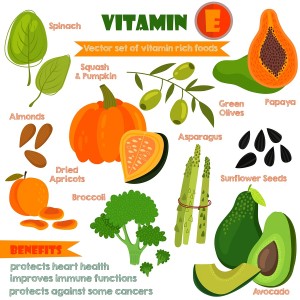An article from Tokyo, Japan describes a study that showed that higher vitamin E intake lowers the risk of high blood pressure. Dr. Akiko Kuwabara and his team analyzed data from 1,405 men and 2,102 women aged 40 and older (average age about 63) from Japan’s National Health and Nutrition Survey 2007. Diet recordings were evaluated for vitamin E content and other nutrients. Hypertension was defined as systolic pressure of 140 mmHg or higher or a diastolic blood pressure of 90 mmHg or higher. Those participants who had an intake of vitamin E in the top 1/3 of the participants had a 27% lower risk of high blood pressure; the middle 1/3 group of vitamin E intake had a 19% lower risk of high blood pressure. The lower 1/3 was taken as the reference point.
Dr. Kuwabara explained that oxidative damage is closely related to the development of cardiovascular disease. Vitamin E is a fat-soluble vitamin that inhibits oxidation of unsaturated fatty acids. This interferes with the arteriosclerotic process, which widens the arteries and lowers blood pressure.
Comment
Vitamin E seems to have a key role in protecting LDL cholesterol from being oxidized. This is the first step that leads to foam cell production and subsequent atheroma formation in the arterial wall.
We also know that oxidation of LDL cholesterol and subsequent hardening of the arteries is associated with endothelial (lining of the arteries) dysfunction, which interferes with the production of nitric oxide, a signalling substance that relaxes arteries and lowers blood pressure. Most clinical trials have been done with alpha tocopherol, but in nature there is a mix of several tocopherols including gamma tocopherol, collectively called vitamin E. This may be why conflicting research results have been obtained when vitamin E supplements (containing mainly the cheaper alpha tocopherol) were tested. However, gamma tocopherol should be the main ingredient in a vitamin E supplement in order to benefit your blood vessels and heart.
More on hardening of arteries(arteriosclerosis): https://nethealthbook.com/cardiovascular-disease/heart-disease/atherosclerosis-the-missing-link-between-strokes-and-heart-attacks/
More on high blood pressure: https://nethealthbook.com/cardiovascular-disease/high-blood-pressure-hypertension/
Reference: http://www.ncbi.nlm.nih.gov/pubmed/25297612







